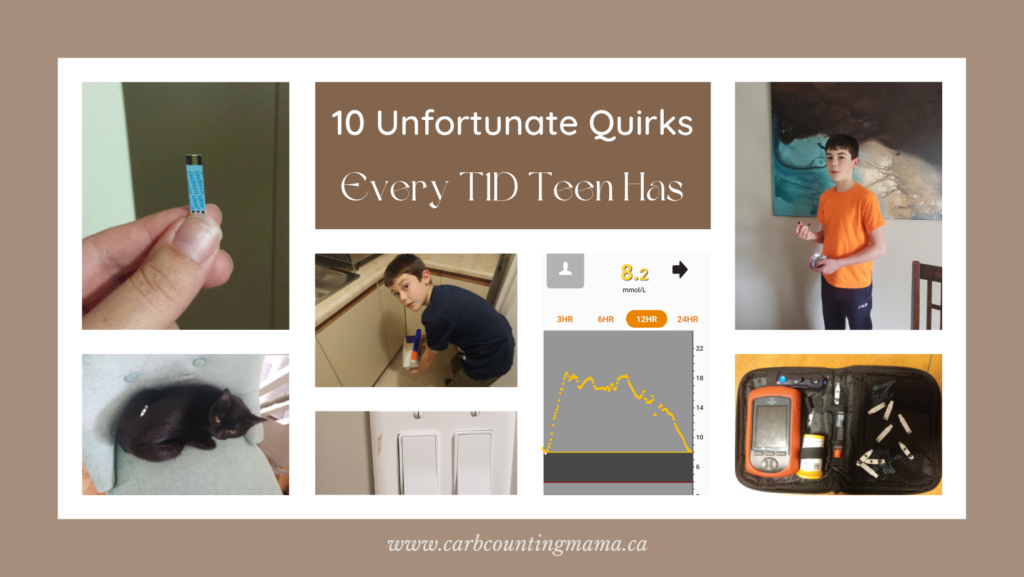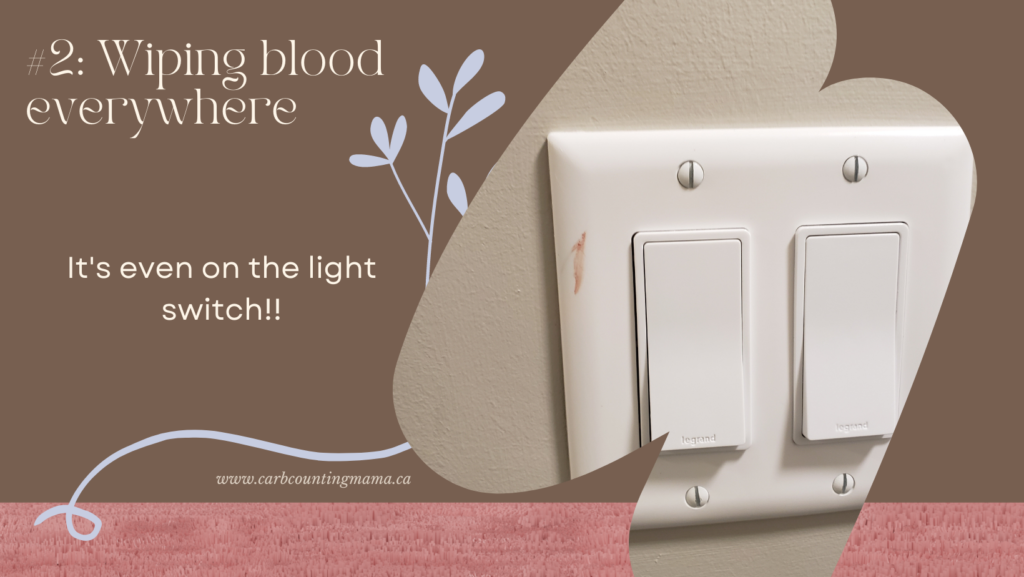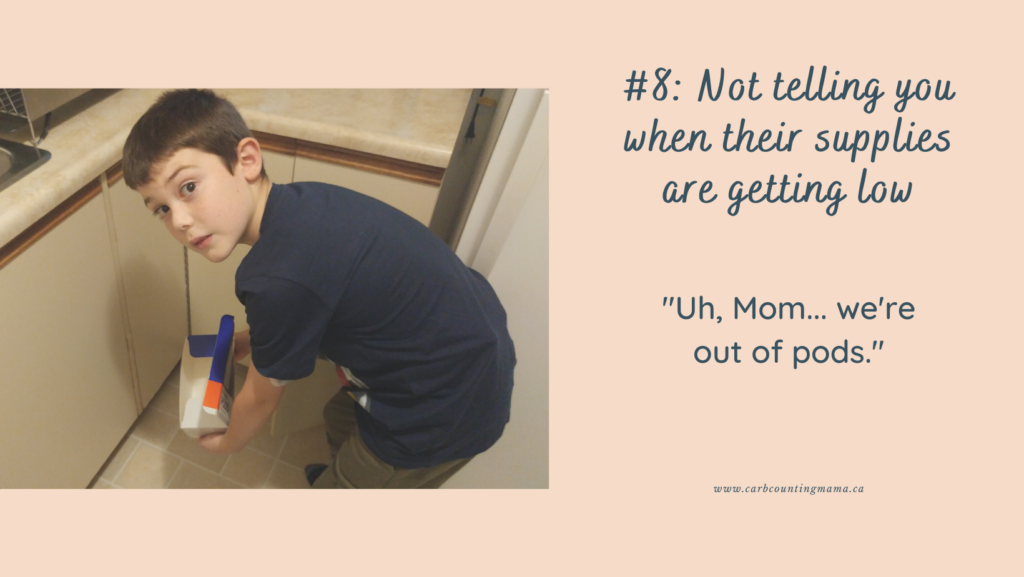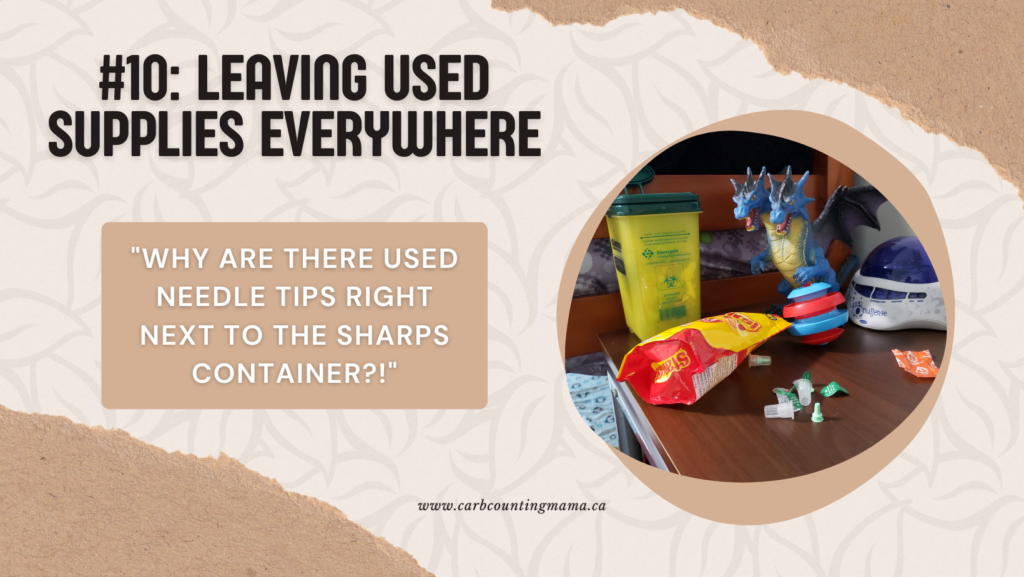We celebrated my son’s 10th diaversary earlier this month. 10 years of T1D. That means he’ll be a teenager soon. And, with the teenage years imminently upon us, I thought I’d commemorate Jordan’s 10th diaversary with a list of 10 habits every T1D teen (and preteen) does that their parents and caregivers find frustrating. So here it is, some are funny, some are serious, and all are relatable if you have a T1D teen!
Before we jump into the habits themselves, there are a few important things to note:
- The purpose of this article is to let parents know that what their T1D teen is doing is completely developmentally normal… frustrating, but normal.
- These habits are not exclusive to teenagers. They apply to almost everyone who has T1D.
- In general, none of these quirks are done maliciously. The intent is not to aggravate you, nor is it to harm themselves. There are very simple explanations for each and every one of them… it mostly has to do with natural child development, often specifically brain development.
However, if you believe your child is intentionally causing harm to themselves, seek counseling or other outside assistance immediately. Counselors who specialize in chronic illnesses can be particularly helpful. - There are kind, respectful ways to deal with all of these habits. Handing out punishments or imposing consequences because of T1D management is not recommended and it will often backfire.
- Scare tactics and threats are also not likely to help and can be damaging.
And now, without further ado:

1. Snacking without bolusing
Kicking it off with everyone’s favorite T1D teen habit… snacking without bolusing or “sneaking” food.
I put sneaking in quotation marks because I really dislike that term, but it’s the term most people use. Honestly, though, it’s much more accurate to call it snacking without bolusing or forgetting to bolus.
I know, I know. “How could they ‘forget’ something so important?! They have to do this multiple times every day. They should have this figured out by now.”
I hear you.
But…
Have you ever misplaced your keys? Or wallet? Have you ever forgotten an appointment? Or the one thing that you went to the store for?
Most adults do things like this on a fairly regular basis. Why wouldn’t teens?
“Because this is life or death“, you say.
But…
Is it? Teenagers believe they’re invincible. Their brains aren’t fully developed and they don’t think about potential consequences the same way that adults do. They just don’t. And besides, they have watched us casually deal with highs and lows for quite a while now.
“Correct and move on” is a very common phrase in the T1D community. We’re modeling this mindset and then getting frustrated when they follow suit.
Don’t worry, you don’t have to resort to putting a padlock on your fridge and pantry.
Simple is best. Sticky note reminders in strategic places. Frequently checking bg or glancing at the CGM data more often so that, when they do forget to bolus, you can catch it and deal with it more quickly.
Generally paying closer attention. I can’t tell you how often I’ve had to use the phrase, “You remember you have diabetes right? Insulin might be helpful.” when I see my son grabbing a snack and his insulin is nowhere in sight.
It’s frustrating for sure, but it’s also a completely normal occurrence for T1D teens and preteens.
2. Wiping blood everywhere

Ever wonder what your T1D teen’s room would look like if you had one of those UV lights that they use in CSI? There would probably be blood everywhere.
They wipe blood on everything!
Their clothes, their bedding, the case that their glucometer is in… everything.
Unless, you know… they lick the blood instead.
I honestly don’t know which is worse. Either way, get that kid a box of tissues! Actually, it’s probably not worth the effort. You’ll just end up with a T1D teen who wipes blood on everything and a box of unused tissues.
3. Sleeping through alarms
One day, your T1D teen is going to move out on their own and they’ll have to manage their T1D solo. You’re worried because they never, ever wake up when their alarms go off.
This concern is understandable but likely unnecessary. Children and teens sleep through alarms. T1D or not. Alarm clocks, fire alarms, all sorts of alarms.
The reason they don’t wake up is simple: kids and teens need their sleep.
In general, children and teens spend more time in deep stages of sleep than adults do. They also require stronger auditory stimulus to awaken. Research has shown that a parent or caregiver’s voice is more likely to wake a sleeping child or teen than an alarm.
So, while it may seem scary that in 5 years, or 3 years, or 1 year your T1D teen will be on their own, “training” them to wake up to their alarms is usually unnecessary and futile.
There’s no reason to interrupt their sleep in order to practice. Most people grow out of that stage. And even if they don’t, there are lots of tricks and gadgets out there that can help them wake to diabetes alarms.
So, grab some coffee. We’re going to be doing night checks for a while still.
4. Rage bolusing
You may not have heard the term for it, but I bet your T1D teen has done it.
The term “rage bolus” was coined by T1D author and blogger Kerri Sparling. Her definition is:
“The act of taking an aggressive correction dose of insulin after experiencing prolonged and frustrating high blood sugars. Often results in a hypoglycemic event.”
Basically, it’s when you get frustrated with a stubborn high bg and instead of doing the calculation and dosing, you give more than you think you should. Adults with T1D do it, and caregivers of T1D children do it. So of course, our T1D teens are likely to do it as well.
Diabetes is frustrating. Sometimes what we think should work doesn’t work. It’s not unreasonable to get to a point where you try something that you know will work, even if it might cause a low.
You probably can’t stop your T1D teen from rage bolusing. But, you can teach them how to do it more responsibly.
If your teen insists on responding to stubborn highs in this way, show them how to catch the drop. Scott Benner from The Juicebox Podcast does something similar with his daughter’s high bg, except his version is more controlled.
Learn how to “crush it and catch it” in episode #463 of the Juicebox Podcast, Defining Diabetes: Crush It And Catch It.
5. Leaving test strips all over

It doesn’t matter how many sharps containers or garbage cans you have. If there’s a T1D teen in your house, you’re going to find used test strips.
Often, it’s because the used ones get thrown back into their glucometer case. Eventually, it’s too many for the poor case to handle and they spill out.
You find them when you vacuum. They stick to your clothes. They end up stuck to the pets. In the litter box. In the fridge. On the stairs and in everyone’s beds.
They somehow end up in rooms that your T1D teen doesn’t even use!
I have no solution for this quirk. You just have to get used to it. My best suggestion is to leave them all until Easter and set up a family “Easter test strip hunt” to see who can find the most. Good luck!
6. Blind bolusing
This is very different from rage bolusing.
Blind bolusing is when your T1D teen gives a bolus, but doesn’t have the information needed to bolus accurately. They either don’t check their bg before bolusing, or they don’t do any sort of carb counting or swagging.
This, of course, can be quite dangerous. But the reason they do it is quite simple.
A lot of people look at the situation when their T1D teen blind boluses and think that the reason is laziness. That’s not quite it.
Sure, all they had to do was glance at their phone for their bg number. Or take 30 seconds to do a finger poke. Unfortunately, it doesn’t matter how simple the task is. The fact is, they’re so focused on their own priorities that it doesn’t even enter their minds.
Teenagers are at an interesting developmental stage. They’re in a struggle between wanting control of their lives and environment, while also wanting to “please” authority figures. This combination causes them to cut corners and lie to us. It’s not unlike the situation in Turning Red… except, you know, they don’t turn into a giant red panda… probably.
One of the best ways to deal with blind bolusing is simple reminders when you notice it and discussions about why it can be dangerous. Staying away from blaming, shaming, and accusing goes a long way as well.
They’re not doing it to hurt themselves. They’re not doing it because they’re lazy. It’s a chore that they’d rather not do. Help them find a way to get into the habit of doing it. Hopefully, a habit that will stick with them through their adult years.
7. Ignoring alarms and texts
Alarm fatigue. It’s a tricky thing.
Nowadays, we’re inundated with constant stimulation. Videos, alarms, alerts… it’s neverending. And it can be very difficult for our brains to identify which ones are important and which ones aren’t.
Our brains are fully developed. It’s even harder for our T1D teens to sift through all of the noise.
That’s the first part of the problem. Our teens ignore their alarms and texts from us because they get them so frequently. They just want to turn it all off sometimes.
The other part of the problem is that they’re doing something else. They’re playing that video game, talking to their friends, or working on a project. If we’re lucky, they might even be doing school work once in a while.
You know when you’re busy and someone texts you? And you say to yourself, “I’ll respond to them when I’m done the laundry.” And the next thing you know, it’s been a week and you still haven’t responded.
It’s like that. Your T1D teen is clearing their alarm without looking at it or sending you the generic “ya” or “ok” text but not taking action.
Unfortunately, rather than forgetting to text Becky back about your famous chicken recipe, your teen is inadvertently ignoring their health.
The solution to alarm fatigue is simple, but takes a bit of effort. Reduce the number of texts and alarms that your teen gets. Set their alerts so that they’re specific to your child and their T1D. For instance, if you always wait a full 3 hours between correction doses, there’s no reason to have the high alarm set to alert every half an hour.
8. Not telling you when their supplies are getting low

Sometimes when our children start gaining more independence, we take a step back. That can cause problems with this T1D teen habit.
Just as every teen likes to put empty cereal boxes back in the cupboard, T1D teens tend to use up their supplies without saying anything to anyone when they’re running low.
It’s great that they replenish their D-bag with supplies like test strips and spare pump supplies or pen needles. But it’s not so great when they go to grab something and realize that the box in the supply cupboard is empty.
When they start taking control, checking their own bg, and changing their own sites, we tend to relax a bit. Between that and how busy life gets, we might not realize that the T1D supplies are getting running out. It’s very helpful to have a wonderful T1D community for situations like this. But how do we avoid the situation in the first place?
Organization. Whether you keep a schedule or a list of inventory. Whether you take it on solo or involve your teen in the process. Being organized (and teaching your child your method) can mean the difference between having a pod when it’s pump change time or scrambling to figure out alternatives.
9. Making up BG numbers
Every T1D teen will do this. When you ask, “what’s your bg?” they will give you a number that they know is in the acceptable range. Maybe they really did check or maybe they didn’t bother. Regardless the number itself is made up.
I mentioned earlier that it’s developmentally normal for teens and preteens to lie. Let’s talk a bit about why that happens.
The reason that children and teens lie is that they’re kind. They’re trying to balance their desire for autonomy and their desire to be accepted by you, to keep you happy, to stay connected with you.
You want them to do what you want them to do, and they have a whole different set of inner desires. They want to do what they want to do.
To keep you happy while honoring their own desires, they will tell you what they think you need to hear in order to strike that balance. Something’s gotta give, and if it is a matter of telling the story the way they think you want to hear it, how perfect! It’s actually a very kind approach to a rather tricky problem when you think about it.
However, when it comes to T1D, lying can be especially problematic.
The best solution to this problem is two-fold.
- Connection. Talk to your teen. Ask why they’re making up numbers. Are they worried about disappointing you? Are they embarrassed to check bg in front of their peers at school? Maybe they’re experiencing burnout? Figure out the root of the problem and brainstorm solutions together.
- No judgment. Try as we might, it’s very difficult to convey complete acceptance. It’s more than not punishing for T1D-related things. We’re talking about perceived judgment as much as intentional judgment. Using words like “good” and “bad” to describe bg numbers can come across as judgemental. Angry or frustrated facial expressions and sounds in response to bg numbers can feel like criticism.
When you go to diabetes appointments and meet with your teen’s doctor, do you feel like you’re going to the principal’s office? Even when you know that you’re doing your best? Because they might judge you for that low or high that happened the other day?
I hope you don’t feel that way at your child’s appointments. And I’m sure you don’t want your child to feel that way at home.
We should all do our best not to make our children feel that way. Every day of their lives. In their home, their safe place. With their family.
This behavior will not change overnight. But the absolute best solution is true support and collaboration. It’s you and your teen against T1D. Not you and your teen against each other.
10. Leaving used supplies everywhere

Can you even call yourself a T1D teen if you don’t leave needles or pump packaging lying around? If you thought finding test strips everywhere was bad, this habit is going to drive you over the edge.
Stepping on Lego pieces is terrible, but it’s nothing compared to stepping on a used lancet or pen tip.
Discarded wrappers and almost empty juice boxes are strewn about their bedroom.
Don’t even get me started on the discarded vial of insulin under the bed! It wasn’t even empty. It’s probably expired by now.
It’s our turn to balance differing wants and needs. Teenagers want, and need, privacy. We want their room to be passable as something other than a toxic waste site. And ideally, not lose any expensive supplies or insulin along the way.
We also don’t want to destroy our relationship with them in the process.
It’s best to work together to figure out how to manage this balance. The solution will look different for different families. Maybe more accessible sharps containers and garbage cans are needed (although apparently not for my son, as you can see in the photo). Maybe they want you to check their room once a day to check for stray diabetes supplies.
It’s not just T1D Teens who have these quirks
Everything on this list is a habit that almost every person with T1D either currently does, has done in the past, or will do in the future. The reason we focus on teens and preteens is quite simple.
When our children are younger, we do most of the diabetes management for them. They don’t have the opportunity to do any of these things yet. And, when they grow up and move out of the house, these are details that we simply wouldn’t notice as much anymore.
Adults with T1D do these things. Parents and caregivers of T1D children do these things.
We forget things. Get exhausted. Fib to avoid unpleasant situations. And do things the easy way instead of the right way. We’re human.
And so are our teenagers.
So, give them a little slack. Try to see things from their perspective. The teenage years are difficult on their own, let alone adding T1D to the mix. We need to focus on support, collaboration, problem-solving, and compassion. There’s no room for finger-pointing, judgment, and punishments.
After all…
None of us was meant to be a pancreas.
~ Leah
Have you dealt with these habits with your T1D teen? Did you do these things as a teen or adult living with T1D? Leave a comment below!
For more tips and stories about T1D, join the Carb Counting Mama email list, and make sure to head over to the Carb Counting Mama Facebook page and “like” it.
Leave a Reply